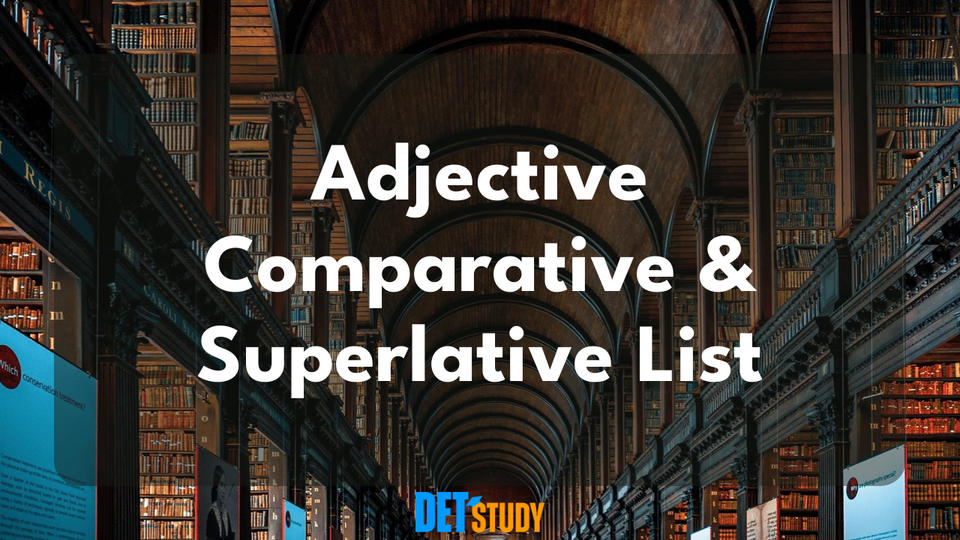Adjective Comparative Superlative List: Boost Your Language Skills with Our Comprehensive Guide

Adjectives are words that describe or modify nouns, giving more information about the object, person, or place in question. In English, adjectives can change form to express comparisons. Understanding these forms helps create clearer and more precise sentences. The two main forms for comparison are the comparative and superlative.
1. Comparative Adjectives
Comparative adjectives are used to compare two things. Generally, they highlight the difference between two nouns. There are two primary ways to form comparatives based on the structure of the adjective:
- For one-syllable adjectives, add "-er" to the end of the adjective:
- Tall → Taller
- Fast → Faster
-
Small → Smaller
-
For adjectives with two syllables ending in "-y", change the "y" to "i" and add "-er":
- Happy → Happier
- Crazy → Crazier
-
Busy → Busier
-
For adjectives with two or more syllables, use "more" before the adjective:
- Beautiful → More beautiful
- Interesting → More interesting
- Difficult → More difficult
2. Superlative Adjectives
Superlative adjectives are used to express the extreme or highest degree of a quality among three or more nouns. They generally indicate the best, worst, or maximum degree of something:
- For one-syllable adjectives, add "-est" to the end of the adjective:
- Tall → Tallest
- Fast → Fastest
-
Small → Smallest
-
For adjectives with two syllables ending in "-y", change the "y" to "i" and add "-est":
- Happy → Happiest
- Crazy → Craziest
-
Busy → Busiest
-
For adjectives with two or more syllables, use "most" before the adjective:
- Beautiful → Most beautiful
- Interesting → Most interesting
- Difficult → Most difficult
3. Irregular Adjectives
Some adjectives do not follow the regular patterns of comparison and have irregular forms for their comparative and superlative versions:
- Good → Better → Best
- Bad → Worse → Worst
- Far → Farther/Further → Farthest/Furthest
Examples in Sentences
- Comparative: "She is taller than her brother."
- Superlative: "She is the tallest in her class."
- Irregular Comparative: "This book is better than the one I read last week."
- Irregular Superlative: "This is the best cake I've ever tasted."
By understanding and practicing these forms, you can describe things more precisely and express comparisons effectively. Remember that some adjectives are exceptions and may not follow these rules, so learning these irregular forms is also essential for mastering comparative and superlative structures in English.
Common Adjective Forms and Their Comparatives and Superlatives
Understanding how to form comparatives and superlatives from adjectives is crucial for effective communication in English. Here is a helpful list that categorizes common adjectives according to their regular transformation patterns. This will guide you in creating comparative and superlative forms accurately.
One-Syllable Adjectives
For most one-syllable adjectives, add "-er" for the comparative form and "-est" for the superlative form.
- Tall: taller, tallest
- Fast: faster, fastest
- Short: shorter, shortest
- Old: older, oldest
- Young: younger, youngest
Two-Syllable Adjectives Ending in "Y"
For two-syllable adjectives that end in "y," change the "y" to "i" and add "-er" for the comparative and "-est" for the superlative.
- Happy: happier, happiest
- Busy: busier, busiest
- Early: earlier, earliest
- Lazy: lazier, laziest
Two or More Syllables
For adjectives with two or more syllables (that do not end in "y"), use "more" for the comparative and "most" for the superlative.
- Beautiful: more beautiful, most beautiful
- Intelligent: more intelligent, most intelligent
- Important: more important, most important
- Comfortable: more comfortable, most comfortable
Irregular Adjectives
Some adjectives have irregular comparative and superlative forms. These do not follow the regular rules and must be memorized.
- Good: better, best
- Bad: worse, worst
- Far: farther/further, farthest/furthest
- Little: less, least
- Much/Many: more, most
Examples in Sentences
-
One-Syllable: - John is taller than Mike. - Sarah is the tallest in her class.
-
Two-Syllable Ending in "Y": - This task is easier than the last one. - Of all the tasks, that was the easiest.
-
Two or More Syllables: - This book is more interesting than the movie. - She is the most talented artist I know.
-
Irregular: - This apple is better than that one. - This is the best meal I've ever had.
Understanding these patterns will improve your English proficiency and help you describe things more vividly and accurately.
Irregular Adjectives: Exceptions to the Rule
In English, most adjectives follow a predictable pattern when forming comparatives and superlatives. Typically, you add "-er" for the comparative form and "-est" for the superlative. However, some adjectives are irregular and don't follow this pattern. These exceptions are essential to learn because they are commonly used in everyday conversation.
Here's a list of some of the most important irregular adjectives:
- Good
- Comparative: Better
-
Superlative: Best
-
Bad
- Comparative: Worse
-
Superlative: Worst
-
Far
- Comparative: Farther/Further
-
Superlative: Farthest/Furthest
-
Little
- Comparative: Less
-
Superlative: Least
-
Much/Many
- Comparative: More
-
Superlative: Most
-
Old
- Comparative: Older/Elder
- Superlative: Oldest/Eldest

Usage Tips
-
Good/Better/Best: These forms are used to evaluate quality. For example, "His performance was good, but yours was better. Hers was the best."
-
Bad/Worse/Worst: Use these to discuss negative qualities. For example, "The weather was bad yesterday, but today it's worse. Tomorrow might be the worst."
-
Far/Farther/Further: "Farther" often refers to physical distance, while "further" can refer to metaphorical distance. For instance, "The store is farther down the street. Let's discuss this further."
-
Little/Less/Least: These terms are used mainly with uncountable nouns. For example, "I have little time today, but less time tomorrow. Thursday is my least busy day."
-
Much/Many and More/Most: Use "much" with uncountable nouns and "many" with countable nouns. For example, "He has many friends, but she has more friends. They have the most friends."
-
Old/Older/Elder: "Older" is more commonly used in general contexts, while "elder" is often reserved for familial relationships or formal contexts. "She is my older sister. The elder statesman gave a speech."
By familiarizing yourself with these irregular forms, you'll be better equipped to construct correct, natural-sounding sentences in English.
When learning English, understanding how to use adjectives in their comparative and superlative forms is essential. Here are some tips to help you use them correctly:
Basic Rules for Forming Comparatives and Superlatives
-
One-Syllable Adjectives: - Comparative: Add -er to the end of the adjective.
- Example: small → smaller
- Superlative: Add -est to the end.
- Example: small → smallest
-
Two-Syllable Adjectives: - If the adjective ends in -y, change the y to i and add -er for comparatives, or -est for superlatives.
- Example: happy → happier / happiest
- For other two-syllable adjectives, use more for comparatives and most for superlatives.
- Example: peaceful → more peaceful / most peaceful
-
Adjectives with Three or More Syllables: - Use more for the comparative form.
- Example: beautiful → more beautiful
- Use most for the superlative form.
- Example: beautiful → most beautiful
-
Irregular Adjectives: - Some adjectives have irregular forms and do not follow standard rules.
- Example: good → better / best
- Example: bad → worse / worst
Tips for Using Comparatives
- Use comparatives to show the difference between two items, people, or places. Remember to include "than" after the comparative adjective.
-
Example: Sarah is taller than Mike.
-
For adjectives that end in a single consonant preceded by a single vowel, double the final consonant before adding -er.
- Example: big → bigger
Tips for Using Superlatives
- Use superlatives to describe an object, person, or place that stands out as the highest degree when comparing three or more things.
-
Example: Everest is the tallest mountain in the world.
-
Remember to use "the" before the superlative adjective as it specifies that you are talking about the singular most of something.
- Example: She is the fastest runner in her class.
Common Mistakes to Avoid
- Confusion between more/most and -er/-est: Ensure that you're using the correct form based on syllable count.
- Omitting "than": Always use "than" when making comparisons.
- Incorrect: He is better her.
- Correct: He is better than her.
By keeping these guidelines and tips in mind, English language learners can master the use of comparatives and superlatives and add more precision and detail to their descriptions.
Comparative and superlative adjectives allow us to express differences and make comparisons between people, places, or things. Here are some exercises to help you practice using these forms accurately.
Exercise 1: Identifying Comparatives and Superlatives
Look at the list of sentences below. Identify the comparative and superlative adjectives.
- Sarah is taller than Jane.
- This movie is more interesting than the last one.
- Jupiter is the biggest planet in our solar system.
- Of all my friends, Michael is the most talented musician.
- This is the longest book I have ever read.
Answers:
- Taller (comparative)
- More interesting (comparative)
- Biggest (superlative)
- Most talented (superlative)
- Longest (superlative)
Exercise 2: Fill in the Blanks
Fill in the blanks with the correct form of the adjective in brackets—either comparative or superlative.
- This test is _ (easy) than the last one.
- Mount Everest is the _ (tall) mountain in the world.
- I find cats _ (quiet) than dogs.
- Today is the _ (hot) day of the year.
- She is _ (happy) now that she has moved to the new city.
Answers:
- Easier
- Tallest
- Quieter
- Hottest
- Happier
Exercise 3: Sentence Transformation
Transform the following sentences using comparative or superlative adjectives.
- This puzzle is not as challenging as the previous one.
- No one in the team runs faster than Leo.
- This is the most delicious cake of all.
- Her dress is brighter than mine.
- Among the siblings, Jim is the youngest.
Answers:
- This puzzle is less challenging than the previous one.
- Leo is the fastest runner on the team.
- No cake is more delicious than this one.
- My dress is not as bright as hers.
- Jim is younger than all of his siblings.
Exercise 4: Create Your Own Sentences
Using the adjectives below, create one sentence in the comparative form and one in the superlative form.
Adjectives: Smart, beautiful, fast
Sample Answers:
- Smart:
- Comparative: Anna is smarter than Lucas.
-
Superlative: Of all the students, Anna is the smartest.
-
Beautiful:
- Comparative: This garden is more beautiful than the one we visited last week.
-
Superlative: The rose is the most beautiful flower in the garden.
-
Fast:
- Comparative: The cheetah runs faster than the lion.
- Superlative: The cheetah is the fastest animal on land.
By practicing these exercises, you’ll become more comfortable with forming and using comparative and superlative adjectives in everyday conversation.
DET Study provides an extensive suite of over 15,000 practice questions, focusing on leveraging adjectives and adverbs to fortify your grammatical skills. Regular practice with these targeted materials ensures that you approach the Duolingo English Test with enhanced confidence and precision, ready to achieve your desired scores.
🎯 Need more practice? Check out DETStudy.com for expert resources, 15,000+ practice questions, and AI-powered writing and speaking feedback.
Frequently Asked Questions (FAQ)
What is a comparative adjective?
What is a superlative adjective?
How can I create a comparative and superlative adjective list?

